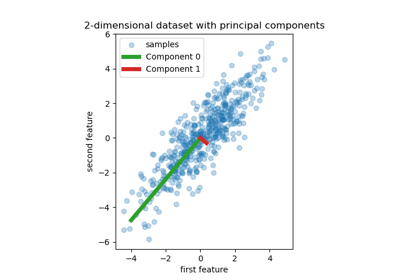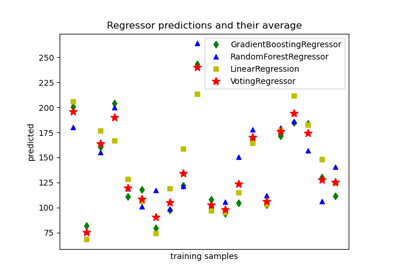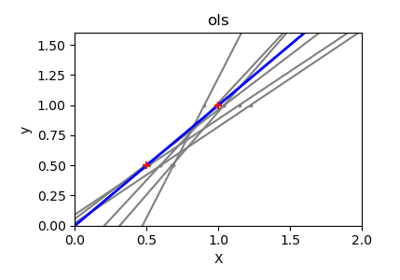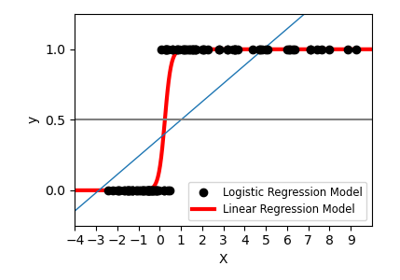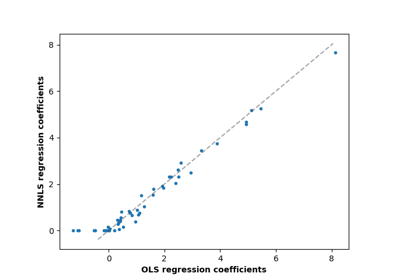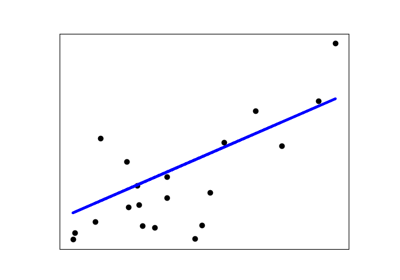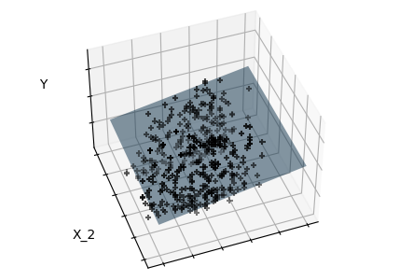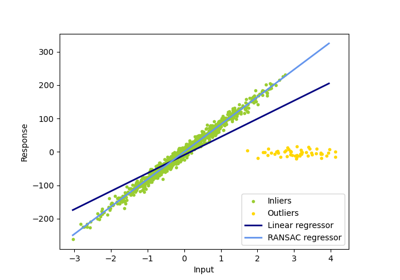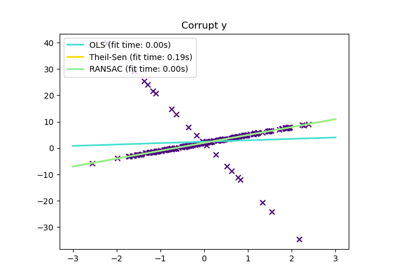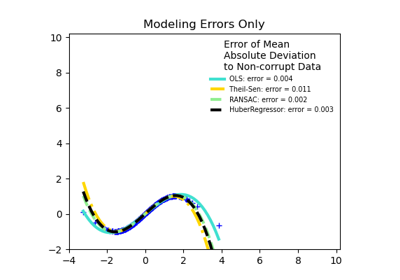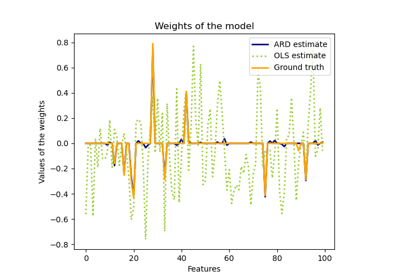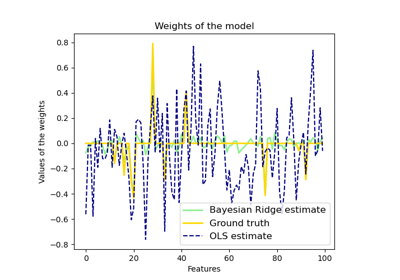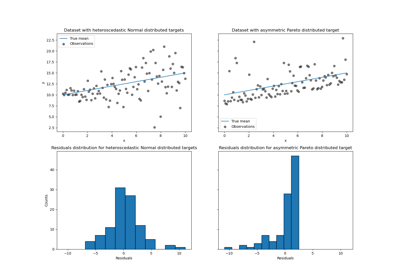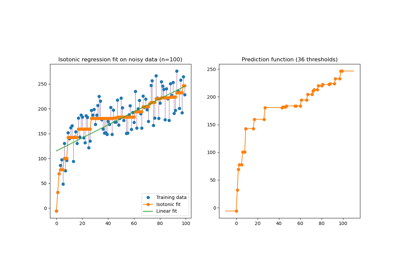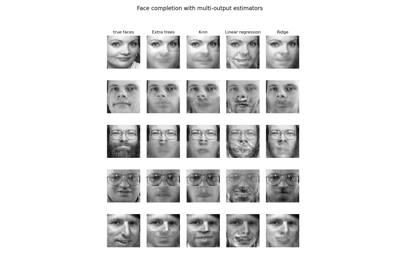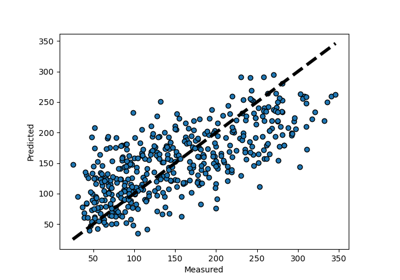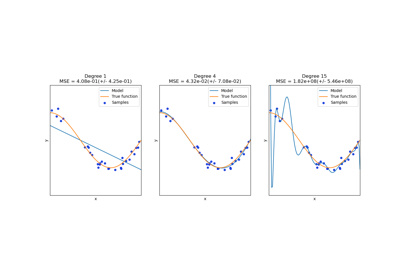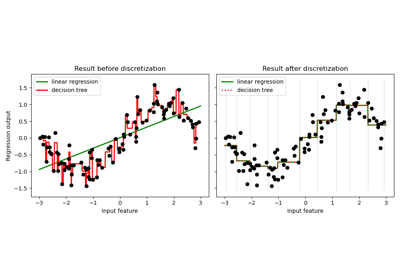sklearn.linear_model.LinearRegression¶
- class sklearn.linear_model.LinearRegression(*, fit_intercept=True, normalize='deprecated', copy_X=True, n_jobs=None, positive=False)[source]¶
Ordinary least squares Linear Regression.
LinearRegression fits a linear model with coefficients w = (w1, …, wp) to minimize the residual sum of squares between the observed targets in the dataset, and the targets predicted by the linear approximation.
- Parameters
- fit_interceptbool, default=True
Whether to calculate the intercept for this model. If set to False, no intercept will be used in calculations (i.e. data is expected to be centered).
- normalizebool, default=False
This parameter is ignored when
fit_interceptis set to False. If True, the regressors X will be normalized before regression by subtracting the mean and dividing by the l2-norm. If you wish to standardize, please useStandardScalerbefore callingfiton an estimator withnormalize=False.Deprecated since version 1.0:
normalizewas deprecated in version 1.0 and will be removed in 1.2.- copy_Xbool, default=True
If True, X will be copied; else, it may be overwritten.
- n_jobsint, default=None
The number of jobs to use for the computation. This will only provide speedup in case of sufficiently large problems, that is if firstly
n_targets > 1and secondlyXis sparse or ifpositiveis set toTrue.Nonemeans 1 unless in ajoblib.parallel_backendcontext.-1means using all processors. See Glossary for more details.- positivebool, default=False
When set to
True, forces the coefficients to be positive. This option is only supported for dense arrays.New in version 0.24.
- Attributes
- coef_array of shape (n_features, ) or (n_targets, n_features)
Estimated coefficients for the linear regression problem. If multiple targets are passed during the fit (y 2D), this is a 2D array of shape (n_targets, n_features), while if only one target is passed, this is a 1D array of length n_features.
- rank_int
Rank of matrix
X. Only available whenXis dense.- singular_array of shape (min(X, y),)
Singular values of
X. Only available whenXis dense.- intercept_float or array of shape (n_targets,)
Independent term in the linear model. Set to 0.0 if
fit_intercept = False.- n_features_in_int
Number of features seen during fit.
New in version 0.24.
- feature_names_in_ndarray of shape (
n_features_in_,) Names of features seen during fit. Defined only when
Xhas feature names that are all strings.New in version 1.0.
See also
RidgeRidge regression addresses some of the problems of Ordinary Least Squares by imposing a penalty on the size of the coefficients with l2 regularization.
LassoThe Lasso is a linear model that estimates sparse coefficients with l1 regularization.
ElasticNetElastic-Net is a linear regression model trained with both l1 and l2 -norm regularization of the coefficients.
Notes
From the implementation point of view, this is just plain Ordinary Least Squares (scipy.linalg.lstsq) or Non Negative Least Squares (scipy.optimize.nnls) wrapped as a predictor object.
Examples
>>> import numpy as np >>> from sklearn.linear_model import LinearRegression >>> X = np.array([[1, 1], [1, 2], [2, 2], [2, 3]]) >>> # y = 1 * x_0 + 2 * x_1 + 3 >>> y = np.dot(X, np.array([1, 2])) + 3 >>> reg = LinearRegression().fit(X, y) >>> reg.score(X, y) 1.0 >>> reg.coef_ array([1., 2.]) >>> reg.intercept_ 3.0... >>> reg.predict(np.array([[3, 5]])) array([16.])
Methods
fit(X, y[, sample_weight])Fit linear model.
get_params([deep])Get parameters for this estimator.
predict(X)Predict using the linear model.
score(X, y[, sample_weight])Return the coefficient of determination of the prediction.
set_params(**params)Set the parameters of this estimator.
- fit(X, y, sample_weight=None)[source]¶
Fit linear model.
- Parameters
- X{array-like, sparse matrix} of shape (n_samples, n_features)
Training data.
- yarray-like of shape (n_samples,) or (n_samples, n_targets)
Target values. Will be cast to X’s dtype if necessary.
- sample_weightarray-like of shape (n_samples,), default=None
Individual weights for each sample.
New in version 0.17: parameter sample_weight support to LinearRegression.
- Returns
- selfobject
Fitted Estimator.
- get_params(deep=True)[source]¶
Get parameters for this estimator.
- Parameters
- deepbool, default=True
If True, will return the parameters for this estimator and contained subobjects that are estimators.
- Returns
- paramsdict
Parameter names mapped to their values.
- predict(X)[source]¶
Predict using the linear model.
- Parameters
- Xarray-like or sparse matrix, shape (n_samples, n_features)
Samples.
- Returns
- Carray, shape (n_samples,)
Returns predicted values.
- score(X, y, sample_weight=None)[source]¶
Return the coefficient of determination of the prediction.
The coefficient of determination \(R^2\) is defined as \((1 - \frac{u}{v})\), where \(u\) is the residual sum of squares
((y_true - y_pred)** 2).sum()and \(v\) is the total sum of squares((y_true - y_true.mean()) ** 2).sum(). The best possible score is 1.0 and it can be negative (because the model can be arbitrarily worse). A constant model that always predicts the expected value ofy, disregarding the input features, would get a \(R^2\) score of 0.0.- Parameters
- Xarray-like of shape (n_samples, n_features)
Test samples. For some estimators this may be a precomputed kernel matrix or a list of generic objects instead with shape
(n_samples, n_samples_fitted), wheren_samples_fittedis the number of samples used in the fitting for the estimator.- yarray-like of shape (n_samples,) or (n_samples, n_outputs)
True values for
X.- sample_weightarray-like of shape (n_samples,), default=None
Sample weights.
- Returns
- scorefloat
\(R^2\) of
self.predict(X)wrt.y.
Notes
The \(R^2\) score used when calling
scoreon a regressor usesmultioutput='uniform_average'from version 0.23 to keep consistent with default value ofr2_score. This influences thescoremethod of all the multioutput regressors (except forMultiOutputRegressor).
- set_params(**params)[source]¶
Set the parameters of this estimator.
The method works on simple estimators as well as on nested objects (such as
Pipeline). The latter have parameters of the form<component>__<parameter>so that it’s possible to update each component of a nested object.- Parameters
- **paramsdict
Estimator parameters.
- Returns
- selfestimator instance
Estimator instance.

